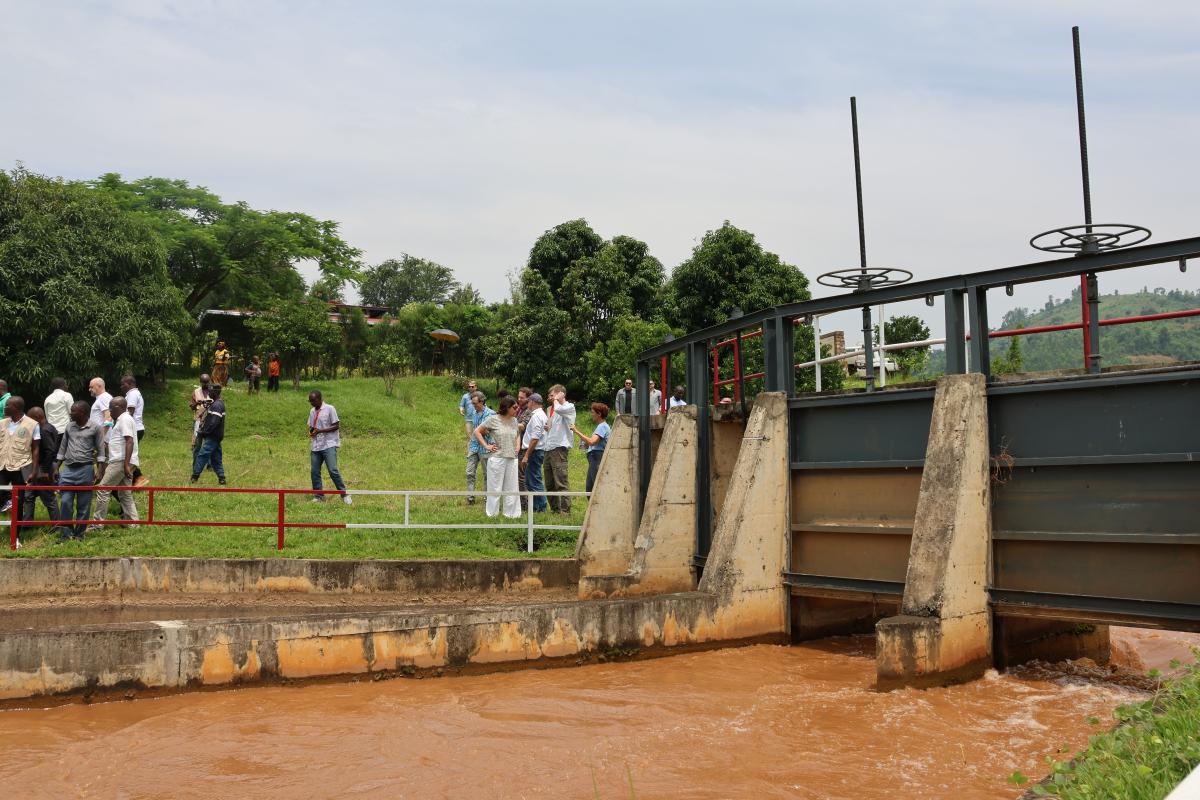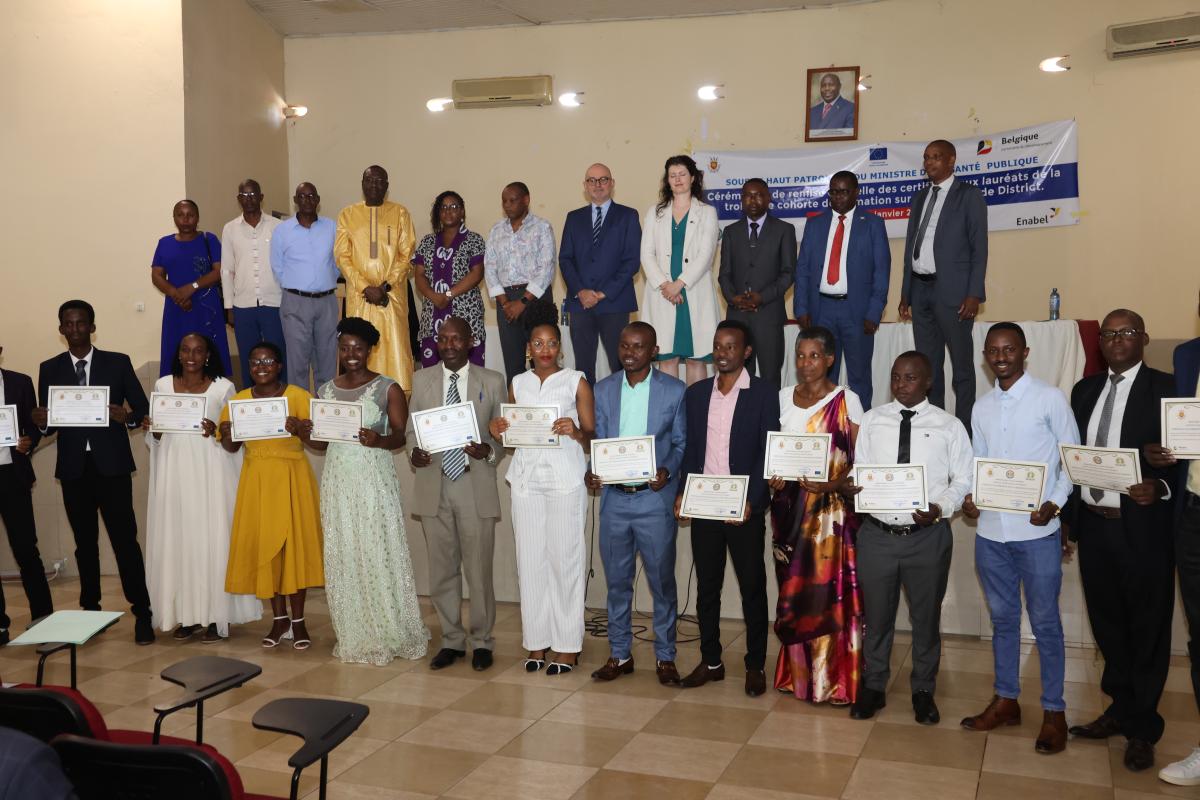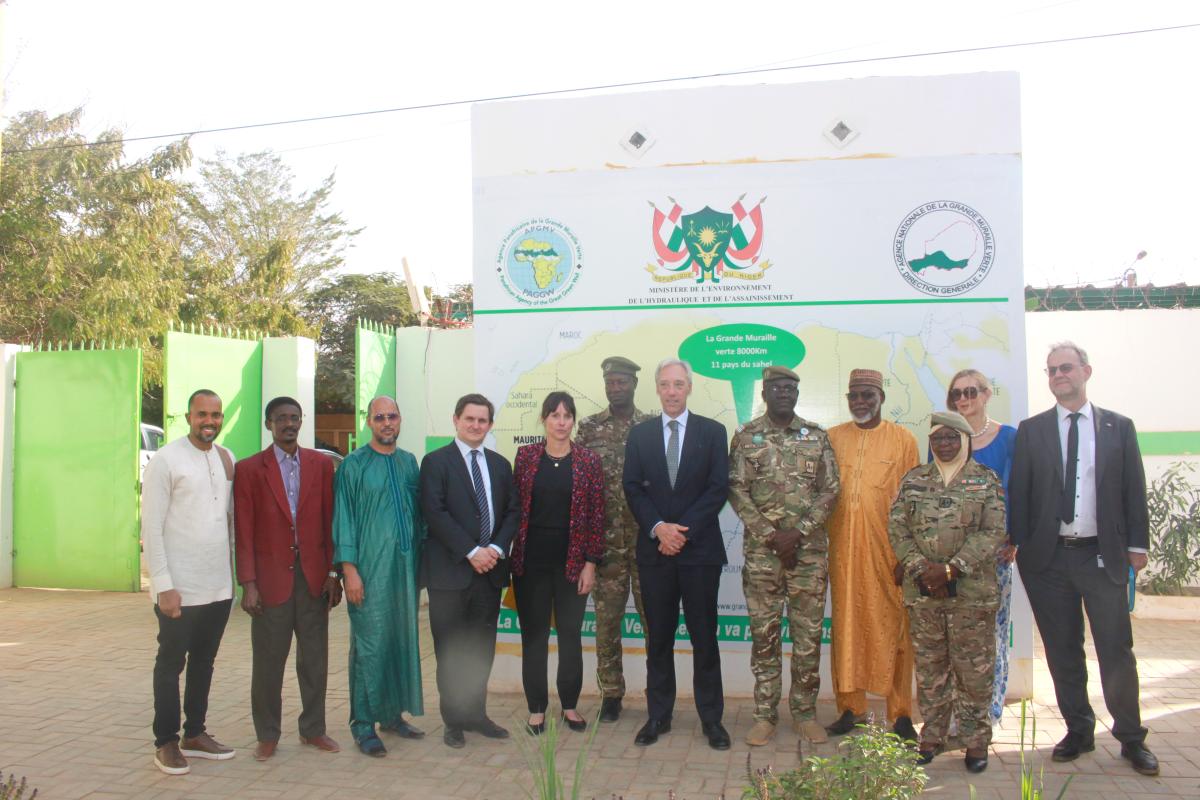Rechercher
Affichage de 15 à 30 sur 3129 actualités
-

Mission conjointe Team Europe dans le sud de la Mauritanie : une vitrine de l’impact de la coopération européenne et belge
Aminata KANE | 15/02/2026
Portée par une initiative de l’Union européenne, cette mission conjointe d’ambassadeurs — S.E.M. l’Ambassadeur de la République fédérale d’Allemagne en Mauritanie Florian Reindel, S.E.M. l’Ambassadeur du Royaume d’Espagne Pablo Bárbara Gómez, S.E.M. l’Ambassadeur de France en Mauritanie Emmanuel Besnier, S.E.M. l’Ambassadeur de l’Union européenne en Mauritanie Joaquín Tasso Vilallonga, et M. Heikki Vandermander, Conseiller aux affaires politiques et économiques qui représente l’Ambassade du Royaume de Belgique — s’est inscrite dans la dynamique Team Europe visant à mieux coordonner les actions des États membres et des institutions européennes sur le terrain. En rassemblant plusieurs représentations diplomatiques autour d’un même itinéraire et de visites de projets phares, l’Union européenne a voulu envoyer un signal fort de partenariat avec les autorités mauritaniennes et de soutien aux populations des régions les plus vulnérables.Au total, 10 sites ont été visités dans quatre wilayas, illustrant la diversité et la complémentarité des interventions européennes :3 sites mis en œuvre par la coopération belge à travers Enabel,2 projets portés par la Agence Française de Développement,1 intervention de la AECID (Espagne),1 infrastructure de formation soutenue par la KfW (Allemagne),1 action relevant de l’instrument européen de stabilité mise en œuvre par la FIIAPP avec les unités GAR-SI Sahel,ainsi que des initiatives de résilience et de gouvernance locale financées par l’Union européenne et la visite du chantier du pont de Rosso, ouvrage structurant pour l’intégration sous-régionale.Une forte visibilité pour la coopération belge et l’action d’EnabelLa visite conjointe des ambassadeurs européens dans le sud de la Mauritanie a offert une vitrine majeure aux actions menées par Enabel en faveur de la sécurité alimentaire, de la résilience et de l’accès à la santé. Cette mission de l’Équipe Europe, qui a rassemblé plusieurs représentations diplomatiques, a permis de démontrer concrètement la contribution de la coopération belge aux priorités nationales mauritaniennes.Trois sites soutenus par Enabel ont constitué des temps forts du programme : Ajar Sarakolé – Jardins maraîchers circulairesCe site illustre une approche intégrée combinant maraîchage, élevage et cultures fourragères, appuyée par des systèmes d’irrigation performants et une production destinée à la fois à l’autoconsommation et aux marchés locaux. Il démontre comment l’appui d’Enabel renforce durablement la résilience économique et alimentaire des ménages ruraux. Yadjende – Périmètre fourragerLe développement des cultures fourragères, associé à la formation des producteurs et à la valorisation commerciale du fourrage, soutient l’embouche, améliore les revenus et renforce le rôle des femmes dans les filières agropastorales.Boghé – Centre de santé et antenne de la CNASSCette visite a mis en lumière l’engagement d’Enabel, aux côtés des autorités sanitaires, pour améliorer l’accès aux soins de santé primaires, renforcer la couverture santé et accompagner la mise en place d’un système de protection sociale plus équitable.Des résultats concrets au bénéfice des populationsCes visites ont permis aux ambassadeurs de constater des résultats tangibles :des infrastructures fonctionnelles,des organisations locales pleinement impliquées,des innovations techniques adaptées aux réalités territoriales,et surtout des bénéficiaires — femmes, jeunes et producteurs — placés au cœur des dispositifs.La complémentarité de l’approche Team EuropeLa mission a également mis en évidence la cohérence et la complémentarité des interventions européennes dans le sud du pays :agriculture et agropastoral, décentralisation, éducation, formation professionnelle, santé, sécurité et grands ouvrages structurants.Dans cet ensemble, Enabel apparaît comme un acteur clé de la mise en œuvre de l’agenda européen, capable de relier les investissements aux dynamiques locales et d’agir au plus près des communautés.Une dynamique porteuse pour la coopération belgePour la Belgique, cette visite :renforce la visibilité de sa coopération,confirme la pertinence des orientations stratégiques,témoigne d’un intérêt croissant pour la Mauritanie.Pour Enabel, elle ouvre de nouvelles perspectives de dialogue stratégique avec les ambassades et les institutions européennes afin de :consolider les synergies,amplifier l’impact des programmes,positionner la coopération belge comme un pilier central de l’Équipe Europe en Mauritanie.
-
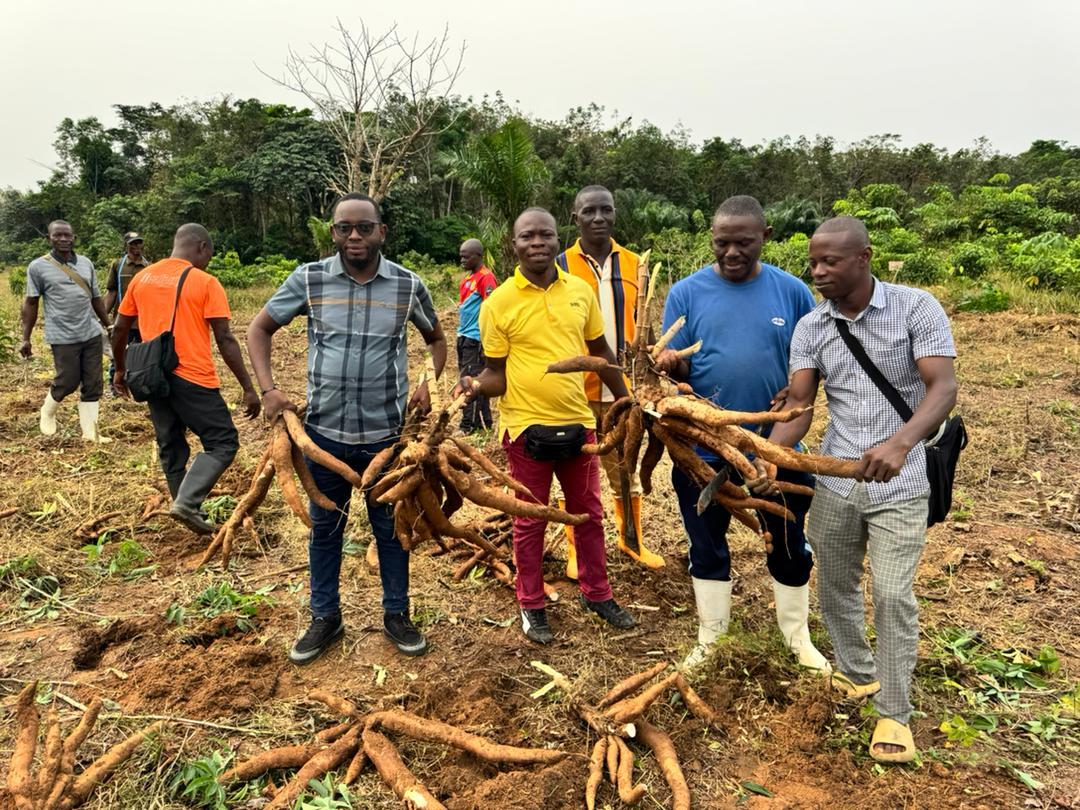
RDC : Des résultats prometteurs pour la culture du manioc à Gwaka
Paola VANGU TSAKALA | 13/02/2026
Des Champs Écoles Paysans pour apprendre en pratiquant À Gwaka, dans le territoire de Budjala, un groupe de formateurs locaux formés au sein des Champs Écoles Paysans (CEP) vient d'enregistrer une première récolte encourageante de manioc. Appuyés par le projet Agriculture et Sécurité Alimentaire mis en œuvre par Enabel, les CEP reposent sur une approche d'apprentissage participatif fondée sur la pratique, l'observation et l'expérimentation directe au champ. Durant les deux cultures de 2025, les moniteurs agricoles se sont concentrés sur l'étude du manioc, aliment de base largement consommé dans la région mais fortement affecté par la mosaïque, une maladie virale responsable d'importantes pertes de rendement. Un dispositif expérimental a été mis en place afin de comparer trois variétés : Wilimowande (variété locale), ainsi qu'Obama et Ilona , deux variétés améliorées. L'objectif était d'identifier la variété la plus résistante et la plus productive dans les conditions agroclimatiques locales. La variété Ilona se démarque Les résultats se sont révélés particulièrement encourageants. La variété Ilona a démontré une forte tolérance à la mosaïque et une performance productive remarquable, avec plus d'une demi-tonne réalisée sur 160 m² — soit l'équivalent de plus de 30 tonnes à l'hectare en neuf mois. À titre comparatif, la variété locale Wilimowande n'a un produit qu'environ 300 kg sur la même surface. « Ilona nous a impressionnés par la densité de son feuillage, même en saison sèche. Dès neuf mois, ses racines tubéreuses mûrissent. Sa capacité à occuper l'espace réduit également les besoins en sarclage », explique Jean-Pierre Lipesu, l'un des agriculteurs impliqués dans l'apprentissage. Un effet multiplicateur au service des producteurs À la suite de cette expérimentation réussie, une vingtaine de moniteurs agricoles formés au CEP de Gwaka ont entamé la transmission de ces nouvelles connaissances à plus de 4 600 producteurs de manioc, dont une majorité de femmes, dans les territoires de Budjala et Gemena. Cette dynamique vise à améliorer durablement la production locale, à renforcer la résilience face aux maladies des cultures et à soutenir l'augmentation des revenus agricoles dans le Sud-Ubangui.
-
Uganda Tourism Association charts tourism future with Strategic Plan, developed in collaboration with Enabel
Jovia KAVULU | 13/02/2026
The Uganda Tourism Association (UTA) has officially launched its Strategic Plan 2026–2030, a landmark step toward strengthening Uganda’s tourism private sector and positioning it for sustainable, inclusive growth. Developed in close collaboration with Enabel, the Strategic Plan sets out a bold roadmap for the next five years. It prioritises institutional strengthening, sustainable financing, improved service delivery, enhanced communication, and the promotion of professionalism, standards, and responsible tourism practices. For Enabel, this launch is the natural progression of years of investment in Uganda’s tourism sector. From strengthening associations and governance systems to promoting training for youth and women, Enabel has consistently worked to build a resilient industry that balances competitiveness with sustainability and inclusion. Enabel has championed Fair Trade Tourism certification, inclusive business models, and occupational safety campaigns in hospitality workplaces. These efforts have contributed to positioning Uganda as a regional leader in responsible tourism. “Tourism today is not only about numbers, but about quality experiences, sustainability, and strong collaboration,” said Nicolas Oebel, Enabel Country Director. “This Strategic Plan reflects that shift, ensuring that Uganda’s tourism growth translates into competitiveness, decent jobs, and tangible benefits for communities.” UTA President Yewagnesh (Yogi) Biriggwa noted that the Strategic Plan provides a clear framework for the private sector to speak with one voice: “This Plan strengthens our ability to represent the industry, coordinate effectively, and ensure that tourism growth benefits not only enterprises but also communities across Uganda.” The Plan also reinforces UTA’s role as the apex body representing Uganda’s tourism private sector. Over the next five years, UTA will strengthen its institutional capacity and expand its membership base, bringing more community-based enterprises under one unified voice to improve coordination and advocacy across the industry. The launch comes at a pivotal moment, following the unveiling of the Uganda Tourism Policy and coinciding with renewed European Union investments worth €20 million, including projects implemented with Enabel and UNESCO to market and brand Uganda globally. In addition, Enabel recently signed a new project with the European Union that will further position Uganda as an attractive tourist destination while empowering communities in and around tourism sites. This initiative will ensure that local people benefit directly from tourism growth through skills development, enterprise opportunities, and inclusive business models. H.E. Jan Sadek, European Union Ambassador to Uganda, welcomed the launch, noting: “Our objective is to support tourism growth that is inclusive and sustainable — marketing and branding Uganda as an attractive destination while ensuring that communities around tourism sites benefit.” The government reaffirmed their commitment to working closely with the private sector, citing ongoing infrastructure investments in destinations such as Bwindi and Kidepo as critical enablers for competitiveness. Enabel continues to strengthen institutions, enhance competitiveness, and promotes green and decent jobs for youth. The UTA Strategic Plan 2026–2030 aligns seamlessly with this vision, offering a structured pathway toward a more professional, resilient, and coordinated tourism ecosystem. As implementation begins, the shared ambition is clear: to build a tourism industry that delivers quality experiences, drives sustainable economic growth, and creates meaningful opportunities for Ugandans across regions.
-

Projet AMIS : Signature des accords opérationnels entre faitières, incubateurs et Enabel
Jacques LENO | 12/02/2026
Enabel Guinée a procédé, le mardi 11 février 2026 à Conakry, à la signature des accords opérationnels avec les faitières des organisations paysannes et les incubateurs des régions de Conakry, Kindia et Mamou. Une étape essentielle dans la mise en œuvre du projet AMIS (Accompagnement, Mobilité, Insertion & Sensibilisation) et dans l’atteinte du Produit 3, qui vise l’amélioration de la (ré)intégration durable des jeunes, des femmes, des personnes vulnérables et des migrants de retour en Guinée. Ces accords concernent spécifiquement, le parcours auto-emploi qui vise à former des jeunes, femmes et personnes migrantes de retour à disposer de leurs propres activités génératrices de revenus. Objectif : permettre aux faitières et aux incubateurs de travailler en synergie pour offrir un accompagnement complet aux jeunes en quête d’autonomisation. Secteurs porteurs concernés : Riziculture Aviculture Apiculture Maraîchage (Kindia & Mamou) Digital (Conakry) Les faitières faciliteront l’accès à la terre et renforceront les capacités des jeunes en pratiques agricoles. Les incubateurs, quant à eux, accompagneront les jeunes inscrits dans les parcours d’autoemploi pour structurer leurs activités génératrices de revenus et améliorer la gestion financière.
-

Climat & Agroécologie au Burkina Faso : la nouvelle génération de chercheurs s’engage !
Geoffroy ZONGO | 09/02/2026
La région du Sahel est particulièrement vulnérable aux changements climatiques. C’est une région où les questions de changement climatique, de dégradation des écosystèmes et de conflit sont étroitement interconnectées et se traduisent par des impacts environnementaux majeurs. Pour renforcer la résilience des populations sahéliennes vulnérables, Enabel, à travers son Portefeuille Thématique Climat Sahel (PTCS) accompagne les communautés locales en améliorant la disponibilité et l’accessibilité aux bonnes pratiques et aux innovations relatives à la résilience au changement climatique et à la restauration des terres. Dans ce cadre, le Portefeuille Thématique Climat Sahel (PTCS) a prévu mobiliser des acteurs du monde scientifique et de la recherche pour contribuer à l’identification et à la diffusion de solutions adaptées et pérennes en matière de gestion durable des écosystèmes sahéliens. C’est ainsi le volet régional et le volet Burkina Faso du PTCS a accompagné la mise en place de trois plateformes d’innovation en matière de la résilience climatique et de la gestion durable des écosystèmes sahéliens dans les communes de Koupéla, Meguet et Boulsa respectivement dans les régions du Nakambé, de Oubri et de Koulsé. Trois centres d’innovation agroécologiques ont été aménagés au profit de ces trois plateformes d’innovation. Dans le cadre de ce projet, six (06) bourses d’études dont trois en Thèse de Doctorat et trois en Master ont été octroyé à des étudiants burkinabé par Enabel. Leurs travaux de recherche sont en cours et contribueront à améliorer les résultats de la recherche dans les domaines de l’agroécologie et du changement climatique et contribuer à l’atteintes des objectifs du portefeuille.Ces étudiants ont conduit leurs recherches dans les centres d’innovation agroécologiques des trois plateformes d’innovation. L’état et les résultats de leurs travaux se présentent dans les lignes qui suivent. Minata SANOU, Doctorante à l’Université Joseph KI-ZERBO mène ses travaux de recherche sur la « contribution de la Faidherbia Albida dans la gestion des sols sous culture agroforestier ».L’objectif général de sa recherche est de contribuer à la résilience aux changements climatiques et à la gestion durable des écosystèmes dans la commune de Koupéla, région du Centre-Est du Burkina Faso.L’étude consiste à faire des enquêtes ethnobotaniques complémentaires sur Faidherbia albida et mettre en place un essai expérimental pour son intégration dans les systèmes de production. Il été également question de prélever des sols des sols (échantillons composites de sol) sous et hors houppier de Parkia biglobosa (Néré), de Vitellaria paradoxa (Karité) et du Faidherbia albida à l’horizon 0-10 et 10-20 cm pour apprécier l’apport en éléments nutritifs de ces espèces agroforestières. Les horizons 0-10 cm ont été analysés grâce au soutien d’Enabel.Les paramètres de croissance dont la hauteur des plants du collet au bourgeon terminal ; le diamètre au collet ; le nombre de feuilles/rameau et le nombre des rameaux/pied ont été mesurés. A ce jour, l’étude montre environ 60 % de taux de réussite de semis et plantation de Faidherbia albida soit 72 pieds/ha.L’étudiante Minata poursuit ses travaux de recherche qui aboutiront à une soutenance de thèse et à des publications scientifiques.OUEDRAOGO Abasse, Doctorant à l’Université Joseph KI-ZERBO mène ses travaux de recherche sur « Evaluation d’extrait aqueux de Calétropis procréa face aux agresseurs d’ordre fongiques du soja au Burkina Faso ». Il conduit sa recherche dans un conte de limitation de la production de soja par les maladies fongiques et son cette étude propose une alternative durable aux fongicides de synthèse : l’utilisation d’extraits aqueux de Calotropis procera et Lippia multiflora, plantes locales accessibles et biodégradables.Son objectif général est d’améliorer la productivité du soja via des traitements naturels. Et de façon spécifique il fait l’inventaire des champignons pathogènes dans la zone de Koupèla. RÉSULTATS CLÉS OBTENUS • Collecte et isolement : 12 souches isolées à partir des semences et 19 à partir des plantes malades. • Prédominance fongique : Aspergillus spp. domine avec 55,39 % des isolats, suivi de Curvularia (9,83 %) et Fusarium (4,91 %). • Enquête de terrain : Sur 100 producteurs interrogés, Lippia multiflora est déjà utilisée traditionnellement pour la conservation des semences, tandis que Calotropis procera reste méconnue et sous-exploitée. • Collecte des plantes : Réalisée à 80 % en période de floraison pour maximiser les composés bioactifs. L’étudiant Abasse poursuit ses travaux de recherche qui aboutiront à une soutenance de thèse et à des publications scientifiques.Vanessa Tégawandé BORO/KABORE, Doctorante à l’Institut International d'Ingénierie de l'Eau et de l'Environnement (2iE), a mené ses travaux de recherche sur « la solution d'imperméabilisation accessible et durable de bassin des collectes des eaux de ruissellement en zone soudano sahélienne ». Elle a conduit sa recherche dans un contexte auquel la gestion durable de l’eau en zone soudano-sahélienne constitue un enjeu stratégique dans un contexte de sécheresses récurrentes, de forte variabilité pluviométrique et de dégradation accélérée des terres agricoles. Les bassins de collecte des eaux de ruissellement (BCER) représentent donc une solution clé pour l’irrigation d’appoint, mais leur efficacité est fortement limitée par les pertes par infiltration. Sa recherche a évalué les performances techniques, économiques et environnementales de cinq matériaux de revêtement (bitume, kaolinite, vertisol, géomembrane PEHD et perré maçonné), à travers (i) une enquête participative auprès de 41 producteurs (méthode WASO-2) et (ii) une expérimentation in situ conduite sur les saisons pluvieuses 2024–2025.Les résultats indiquent que le bitume réduit les infiltrations de 85 %, mais induit une contamination de l’eau par les hydrocarbures totaux, atteignant 2,4 mg/L, incluant des hydrocarbures aromatiques polycycliques (HAP) à potentiel cancérogène. Cette contrainte limite son usage aux contextes non alimentaires. La kaolinite permet une réduction des infiltrations de 82 % avec un excellent rapport coût-efficacité. Le vertisol, bien que performant en fin de saison par gonflement argileux, demeure limité par une forte turbidité et une faible durabilité. La géomembrane PEHD de 80 µm s’est révélée structurellement fragile, tandis que le perré maçonné, bien que robuste, présentait une perméabilité initiale excessive.Une réhabilitation technique, basée sur l’utilisation d’une géomembrane PEHD de 750 µm et d’un perré renforcé par un mortier hydrofuge (350 kg/m³, 10 % Sikalite), a permis une amélioration durable des performances. Le suivi de la qualité de l’eau, fondé sur 11 paramètres physico-chimiques, montre que la géomembrane stabilise les caractéristiques chimiques, mais induit une augmentation des chlorures (+60,23 %) et du pH (+48,40 %). Les revêtements argileux améliorent l’acidité et certains ions (réduction du SAR jusqu’à −74,23 %, augmentation du Ca²⁺), mais génèrent une turbidité incompatible avec l’irrigation localisée.Ces résultats confirment que le choix des revêtements de BCER doit intégrer simultanément les critères d’étanchéité, de coût, de durabilité et de qualité de l’eau, en tenant compte du risque de contamination par hydrocarbures. La géomembrane épaisse (750 microns) et le perré maçonné renforcé apparaissent comme les solutions les plus fiables à long terme pour les conditions agro climatiques soudano-sahéliennes.Vanessa a soutenu sa thèse de doctorat avec brio couronné d’une mention « Honorable ».Vous pourrez consulter ses publications scientifiques par le lien ci-dessus : https://www.mdpi.com/2079-9276/13/10/144 Hamadé BONKOUNGOU, étudiant en Master 2 à l’Université NAZI-BONI /IDR mène ses recherche sur « le renforcement de la productivité du maïs en contre saison a Roumtenga : évaluation variétale et réponse a la fertilisation ».L’objectif de cette recherche est de renforcer la productivité du maïs cultivé en identifiant les variétés et fertilisations adaptées. Plus spécifiquement, l’étude vise à comparer les performances agronomiques de plusieurs variétés de maïs à double usage et à analyser l’effet de la fertilisation chimique, organique et mixte sur le rendement en grain et en biomasse.Les résultats atteints sont entre autres : o Le dispositif expérimental a été mis en place avec succès en contre saison, incluant huit variétés de maïs et quatre types de fertilisation dans un dispositif en split-plot avec répétitions. o Les semis ont montré un bon taux de levée, indiquant une bonne qualité des semences et une bonne adaptation des variétés aux conditions de contre saison. o Les premières observations agronomiques ont permis de collecter des données fiables sur la croissance des plantes, le développement végétatif et la production de biomasse. o Les résultats préliminaires montrent des différences entre variétés et entre modes de fertilisation, suggérant une interaction importante entre le matériel végétal et la gestion de la fertilité des sols. o L’analyse des données montre que des variations ont été observées sur le poids des épis, le poids de mille grains et la production de fourrage.o Actuellement nous sommes dans les corrections pour le dépôt du mémoire Hamadé poursuit ses recherches en préparant sa soutenance. Les résultats de ses travaux contribueront à améliorer les pratiques agricoles au niveau paysans.Aurelie Flavy Rufine ZONGO, étudiante en Master 2 à l’Université Nazi BONI (UNB) mène ses recherche sur « Effet de cinq biofertilisants sur le rendement d’oignon et sur le sol».Ses recherches ont pour but de faire face à la dégradation des sols en utilisant des solutions agroécologiques qui vulgarisent des systèmes et mode de fertilisations respectueuse de l’environnement. Il s’agit d’évaluer l’effet de cinq biofertilisants sur le rendement d’oignon et sur le sol. L’étude vise à promouvoir les pratiques agroécologiques et formuler des recommandations pertinentes pour une agriculture plus efficace. Plus spécifiquement, il s’est agi de comparer l’effet de ces différents biofertilisants sur le rendement de l’oignon et de comparer leurs effets sur la fertilité des sols. L’étude a été mener à Roumtenga, dans la ferme agroécologique ABNA. Le dispositif utilisé était le Bloc Complètement Randomiser (BCR), avec six (06) traitements et quatre (04) répétitions : T0 (Témoin), T1 (bokashi), T2 (compost aérobie), T3 (fumier recyclé), T4 (supermagro), T5 (lifofer). La parcelle d’expérimentation comportait au total 24 micro-parcelles de 3m2. Au début et à la fin de l’étude des prélèvements de sol ont été effectués suivant les diagonales, pour analyse au laboratoire afin de voir l’effet des biofertilisants sur la fertilité des sols. Avant la mise en place de l’essai, une enquête a été faite pour déterminer les cinq biofertilisants utilisés lors de cette étude. Les données agronomiques collectées étaient la hauteur des pieds, le diamètre au collet, le nombre de feuille, le poids des bulbes après récolte.Cette étude a révélé que pour les biofertilisants solides (compost, bokashi, fumier recyclé), le compost a donné les meilleurs rendements avec 2,56 kg/ha contre 2,46 kg/ha pour le bokashi et 1,72 kg/ha pour le fumier recyclé et 0,68 pour le témoin. En ce qui concerne les fertilisants liquides (supermagro, lifofer), le plus grand rendement a été obtenu avec le supermagro avec 1,62 kg/ha contre 0,93 pour le lifofer et 0,68 pour le témoin. On constate alors, que les biofertilisants liquides ont donné de meilleur rendement par rapport aux biofertilisants solides. L’étude a été mené a dans des conditions pas trop propices à la culture de l’oignon et le sol était très argileux ceux qui a beaucoup influencé les résultats obtenus. Ils ouvrent ainsi donc les perspectives d’approfondir l’étude en tenant compte des variations saisonnières, des types de sol et des variétés d’oignon.Aurélie prépare sa soutenance et ses travaux contribueront à améliorer les pratiques agricoles au niveau paysans. Boubacar Sontonnooma SINARE, étudiant en Master 2 à l’Université Nazi BONI (UNB), mène ses recherches sur « les Effets de différentes formulations de compost enrichi sur les paramètres de croissances du niébé [Vigna unguiculata (L.) Walp.] et les paramètres physico-chimiques du sol dans le village de Roumtenga, Burkina Faso ». Boubacar conduit ses recherches dans un contexte où l’agriculture maraîchère est essentielle pour l’alimentation et l’économie rurales au Burkina Faso, mais la dégradation des sols menace fortement la productivité agricole. Face à cette situation, les techniques de gestion durable, notamment l’utilisation de compost enrichi en microorganismes efficaces produit localement (EM), constituent une alternative prometteuse pour restaurer la fertilité des sols. Son étude vise ainsi à contribuer à la gestion durable des sols dans les périmètres maraîchers. Plus spécifiquement, il s’est agi de produire du compost enrichi aux microorganismes efficaces en utilisant des matériaux locaux et d’en évaluer son effet ainsi que d’autres types de fertilisants sur la fertilité des sols en condition de culture. Le dispositif expérimental mise en place à cet effet est un bloc complètement randomisé avec 5 traitements et 4 répétitions. Ce sont : Traitement témoin (T0) ; Compost aérobie simple (T1) ; Compost enrichi au Trichoderma (T2) ; Compost enrichi aux microorganismes efficaces locaux (T3) et le Bokachi (T4). Les paramètres tels que le diamètre et la hauteur des plants, les biomasses aériennes et racinaires, la nodulation du niébé ont été mesurés. Les teneurs en éléments fertilisants ont été déterminées en début et à la fin de l’expérimentation. Les résultats ont montré que les traitements au compost enrichi aux microorganismes efficaces produit localement (T3) et ceux du compost enrichi au Trichoderma (T2) ont donné les meilleures croissances et les biomasses aériennes les plus importantes. La nodulation du niébé a été influencée significativement par l’utilisation du compost enrichi aux microorganismes efficaces produit localement. L’analyse chimique des sols a indiqué une augmentation de la teneur en matière organique qui est passée de 1,38 % à 1,75 % et de celle en N, P et K du sol. Ces résultats confirment le rôle déterminant des composts enrichis dans la restauration et le maintien de la fertilité des sols agricoles et soulignent leur potentiel comme alternative durable aux fertilisants chimiques pour améliorer la productivité des sols au Burkina Faso.Boubacar prepare sa soutenance et ses travaux contribueront à améliorer les pratiques agricoles au niveau paysans.
-

Enabel partners with Ukraine's Ministry of Health and Superhumans to strengthen maxillofacial surgery system
Taisiia DRUZIUK | 09/02/2026
Superhumans, the War Trauma Center, and the Ministry of Health of Ukraine have signed a Memorandum of Understanding to cooperate in the field of maxillofacial surgery as part of a joint project with Enabel.This memorandum represents a systematic response to the complex maxillofacial injuries that Ukrainian healthcare has been addressing under the conditions of a full-scale war. Within the Belgian-funded project, Superhumans will become one of Ukraine’s centers of excellence in maxillofacial surgery. It will integrate the treatment of the most complex cases, professional training for surgeons, and long-term patient follow-up and rehabilitation.The project includes:Establishing centers of excellence in Lviv and KyivLaunching training and simulation hubs for specialist educationDefining patient pathways and implementing a case management systemWorking toward sustainable public funding for complex reconstructive proceduresThe project is planned for 2025–2028 and is being implemented in partnership with the Ministry of Health of Ukraine, Enabel, and leading medical and educational institutions, including:– Danylo Halytsky Lviv National Medical University (Department of Surgical Dentistry and Maxillofacial Surgery)– O. O. Bohomolets National Medical University (Department of Maxillofacial Surgery and Advanced Dental Technologies)– Kyiv Regional Clinical Hospital– Doctors for Heroes NGO
-

Ukraine: Enabel contributes to restoring a damaged clinic in the Kyiv region
Taisiia DRUZIUK | 09/02/2026
An outpatient primary healthcare clinic in the village of Bohdanivka, Brovary district, was severely damaged during the Russian occupation in March 2022. Amid active hostilities, Russian troops used the building as a headquarters and, upon retreat, left it looted and destroyed – without medical equipment or supplies. The clinic, which serves residents of Bohdanivka, Zalisia, and 28 nearby gardening cooperatives, has now been fully restored thanks to the support of the French charitable foundation Mécénat Servier, a partner of the United24 platform.As part of Enabel' partnership with the Ministry of Health of Ukraine, the facility received modern medical furniture and equipment – ranging from children’s height-measuring devices to a gynecological chair. Administrative and staff areas were also fully furnished. Enabel’s support for the Velyka Dymerka community, coordinated with the Kyiv Regional Military Administration, goes beyond healthcare. Belgium is also funding the construction of a shelter for a gymnasium in the village of Shevchenkove, as well as energy-efficiency upgrades to the façade and roof and the installation of inclusive entrance areas at the Velyka Dymerka Lyceum.
-
La Belgique évalue sur le terrain l’impact de ses projets au Burundi
Jonas Eric UWIZERA | 06/02/2026
Dans le cadre d’une mission de suivi de l’impact de la coopération belge, une délégation de la Direction générale de la Coopération au Développement (DGD) représentant les autorités belges, accompagnée de l’Ambassade de Belgique et d’Enabel au Burundi, a effectué une visite de terrain du 26 au 30 janvier 2026 afin de découvrir plusieurs réalisations soutenues par Enabel.La délégation s’est rendue à l’hôpital de Cibitoke, où elle a échangé avec l’équipe de direction et visité le bâtiment d’isolement. Celui-ci est actuellement utilisé pour la prise en charge des cas de rougeole et a été conçu pour répondre à des situations épidémiques, y compris liées à des virus à haut risque comme le virus de Marburg. La visite s’est poursuivie à l’atelier de maintenance des équipements biomédicaux, mis en place avec l’appui d’Enabel pour renforcer la durabilité du matériel médical. Par ailleurs, les projets d’Enabel contribuent à la formation du personnel de santé – médecins, infirmiers de laboratoire et anesthésistes – en chirurgie de district, une approche qui a permis de sauver la vie de 22 800 personnes depuis 2022 dans les hôpitaux accompagnés, dont celui de Cibitoke.La mission a également conduit la délégation au barrage d’irrigation de Nyamagana, qui produit 300 litres d’eau par seconde et permet l’irrigation de plus de 3 000 hectares de terres agricoles exploitées par 5 500 ménages dans la commune de Cibitoke. Deux prises d’eau supplémentaires ont par ailleurs été construites sur la rivière Muhira, permettant l’irrigation de 250 hectares additionnels. Ces aménagements, réalisés dans le cadre du programme PAIOSA, sont aujourd’hui pérennisés par le programme SySAD en cours. Quinze coopératives rizicoles sont accompagnées par ce projet, dont douze produisent du riz sous le label « Akeza K’Imbo », acheté notamment par le Programme alimentaire mondial (PAM) dans le cadre de l'appui aux cantines scolaires, ainsi que par l’organisation ZOA pour soutenir les réfugiés congolais présents dans les camps au Burundi à la suite du conflit à l’est de la RDC.La visite s’est ensuite poursuivie à l’aéroport international de Bujumbura, bénéficiaire d’un partenariat avec le projet PAREX, qui appuie les institutions burundaises dans des domaines stratégiques. Des formations spécialisées destinées aux agents de l’aéroport seront prochainement organisées, au niveau national et international, afin de renforcer leurs compétences conformément aux normes internationales de navigation aérienne.Enfin, la délégation a visité le port de Bujumbura, récemment doté d’un plan directeur à horizon de 15 ans couvrant l’ensemble des ports du Burundi. Élaboré par des consultants du port d’Anvers avec le financement du projet PAREX, ce document stratégique a été officiellement remis à l’Autorité du lac Tanganyika. Une visite du site d’intervention du projet TAKIWAMA a également permis d’observer les contributions des projets en matière d’équipements, de capacités de laboratoire et de suivi de la qualité de la gestion des eaux usées de la ville de Bujumbura, au centre de gestion des eaux usées de Buterere.Cette mission a ainsi permis d’apprécier concrètement la portée des interventions menées par Enabel et de souligner l’importance de la coopération entre la Belgique et le Burundi au service du développement durable.
-

The EU Circular Economy Resource Centre concludes a packed trip to Kenya
Nicoletta FAVARETTO | 04/02/2026
Experts from the EU Circular Economy Resource Centre (EU CERC) spent a productive week in Kenya in December 2025. The visit was aligned with two major events: the DGI Summit at the annual Latitude59 Africa-tech event, followed by the seventh session of the UN Environment Assembly (UNEA-7).Read the full article of David J. Cord here: The EU Circular Economy Resource Centre concludes a packed trip to Kenya - SitraPicture: Topias Dean, Sitra.
-
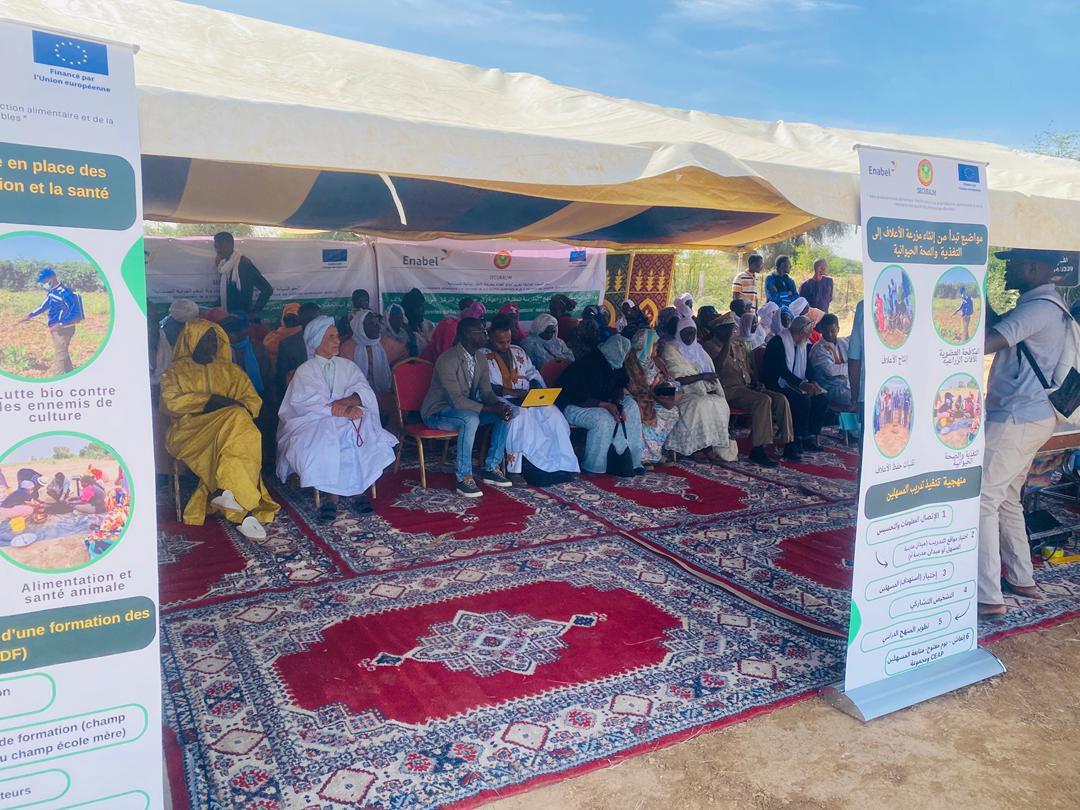
Cultiver l’avenir en Mauritanie : le Champ-École au cœur de la résilience pastorale
Aminata KANE | 02/02/2026
L’innovation agropastorale franchit une nouvelle étape en Mauritanie. Ce jeudi 22 janvier 2026, la localité de Garack (Rosso) a vibré au rythme de la journée portes-ouvertes de l’approche Champ-École Agropastoral (CEAP). Cet événement marquait la fin d'un cycle intensif de 4 mois pour la 3ᵉ cohorte de facilitateurs fourragers : 27 producteurs passionnés, venus des régions Sud, désormais prêts à transformer les pratiques locales.Pourquoi l’approche CEAP change la donne ?Contrairement à une formation classique, le CEAP repose sur « l'apprentissage par la pratique ». Pendant quatre mois, les apprenants ont expérimenté, observé et analysé les meilleures techniques de production fourragère directement sur le terrain.Un dialogue multi-acteurs pour demainAutorités administratives, élus locaux, services techniques et acteurs de terrain se sont réunis pour (1) toucher du doigt les résultats concrets obtenus dans les champs-écoles, (2) échanger sur les acquis techniques et organisationnels et, (3) tracer les pistes de diffusion pour que cette expertise bénéficie au plus grand nombre.« Le développement agropastoral inclusif n'est plus une ambition, c'est une dynamique en marche. » Ce succès est le fruit d’un engagement fort des partenaires qui ont réaffirmé leur soutien pour pérenniser ces acquis et renforcer la sécurité alimentaire dans la région.Le projet SECURALIM pour la souveraineté alimentaire en Mauritanie ambitionne de renforcer durablement la production nationale et la résilience des systèmes alimentaires. Il mise sur la professionnalisation des exploitations agropastorales et l’amélioration de leur performance économique afin d’assurer un approvisionnement régulier des centres urbains en produits de qualité, accessibles à l’ensemble de la population mauritanienne. Il est financé par l'Union européenne et mis en œuvre par Enabel, en étroite collaboration avec les partenaires locaux.
-
Des professionnel·les mieux formé·es pour améliorer l’accès à la chirurgie de district au Burundi
Jean BIRONKWA | 29/01/2026
Le ministère de la Santé Publique (MSP), via l'Institut National de Santé Publique (INSP), a officiellement certifié une nouvelle promotion de 48 professionnels de la santé. Ce renforcement des capacités vise à rapprocher les soins chirurgicaux de la population et à réduire les transferts vers la capitale. Cette promotion se compose de profils complémentaires prêts à opérer en équipe dans un bloc opératoire. Il s'agit de 18 médecins généralistes, 15 infirmiers de bloc opératoire et 15 techniciens anesthésistes. Pour développer les compétences nécessaires aux réalités du terrain, ces lauréats ont suivi une formation intensive de sept mois (1 mois de formation théorique ; 5 mois de pratique intensive et 1 mois de coaching direct en milieu professionnel). Désormais déployés dans 18 hôpitaux de district, ils assurent la prise en charge d'interventions essentielles (complications obstétricales, traumatismes, urgences abdominales et interventions urologiques) qui, auparavant, nécessitaient un transfert coûteux vers Bujumbura. L'impact de cette initiative est double. Pour les patients des zones reculées, c'est la garantie d'un accès rapide à des soins de qualité. Pour les structures de santé, c'est un levier de croissance. Les équipes formées participent au renforcement de l'autonomie des hôpitaux de district et contribuent ainsi à améliorer les recettes hospitalières grâce à la réalisation de nouveaux actes chirurgicaux sur place. Ce programme bénéficie du soutien de la Belgique et de l'Union européenne à travers respectivement les projets NTUSIGARINYUMA et UE-PASS-FBP3 AMAGARA MU MURYANGO mis en œuvre par Enabel. Ces partenaires ont réaffirmé au cours de ces cérémonies leur engagement à contribuer à l'amélioration de la qualité des soins dans les hôpitaux les plus reculés du Burundi. Depuis 2022, cet effort conjoint a déjà permis de trois anciennes promotions de 65 équipes. Les résultats sont tangibles en termes d'amélioration des plateaux techniques et de boost des compétences des ressources humaines disponibles. Les hôpitaux de district ont déjà réalisé environ 29 800 interventions chirurgicales, transformant durablement le paysage sanitaire du Burundi.
-
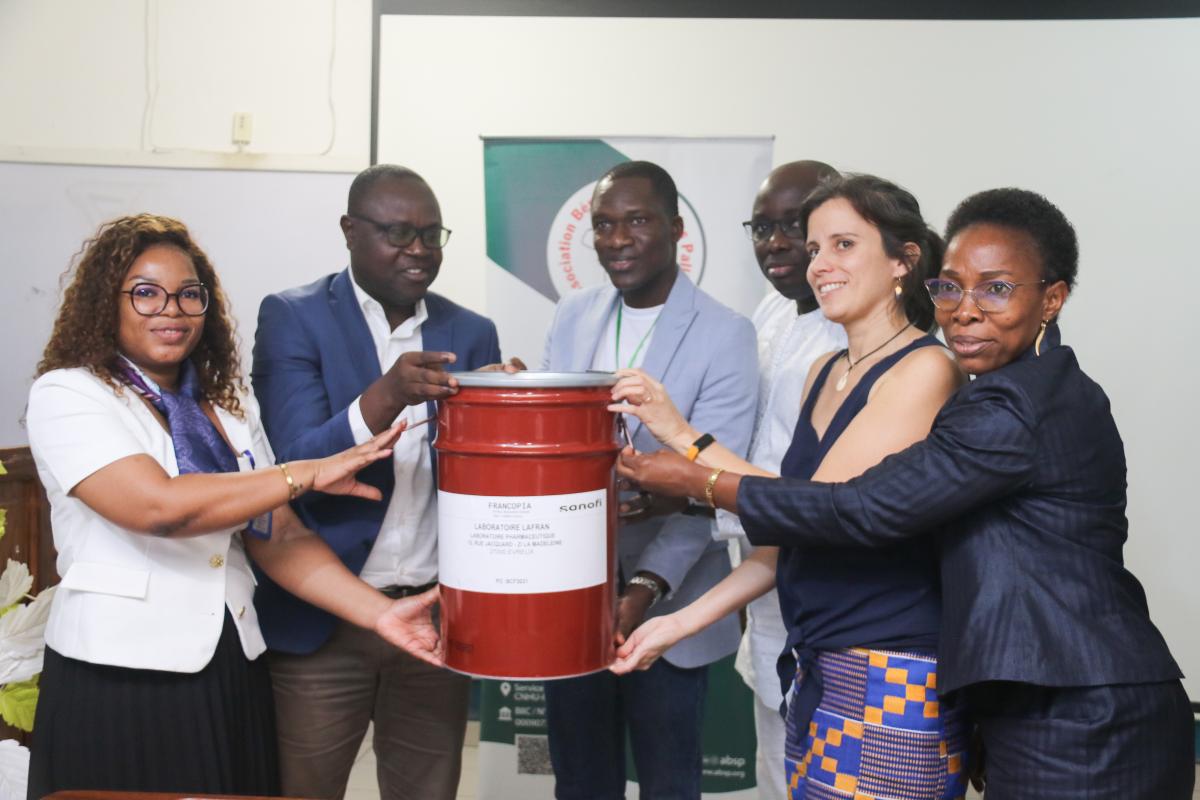
Soulager la douleur, préserver la dignité : un engagement concret en faveur des soins palliatifs au Bénin
Reece-hermine ADANWENON | 27/01/2026
Cotonou, 27 janvier 2026 Dans un contexte où l’accès effectif à la prise en charge de la douleur demeure un enjeu majeur de santé publique, Enabel a procédé à la remise de 5 kg de morphine en poudre au CNHU-HKM, au profit du Programme National des Soins Palliatifs (PNSP). Cette dotation vise à répondre à un besoin immédiat et critique, tout en consolidant durablement la prise en charge de la douleur dans les structures sanitaires du pays.Une réponse essentielle à un enjeu de dignité humaine Lors de la cérémonie de remise, le Directeur Général du CNHU-HKM a rappelé avec force une réalité encore trop souvent vécue par les patients : « ce n’est pas normal qu’en 2026, même si nous sommes en vie, que les agents de santé nous laissent subir les douleurs. » Cette déclaration souligne l’urgence d’agir pour garantir un accès effectif aux soins palliatifs, considérés aujourd’hui comme un droit fondamental des patients, et un marqueur clé de la qualité des systèmes de santé. Un appui structurant au bénéfice de tout le territoire La dotation de morphine en poudre permettra notamment : d’assurer la continuité des soins palliatifs dans les structures sanitaires ; de renforcer la disponibilité des opioïdes essentiels pour la prise en charge de la douleur ; de soutenir la production locale de solution orale de morphine au CNHU-HKM. Cette production locale permettra d’approvisionner l’ensemble du Programme National des Soins Palliatifs, garantissant ainsi une couverture élargie et équitable au profit des patients sur toute l’étendue du territoire national. Un partenariat inscrit dans la durée Depuis plusieurs années, Enabel accompagne le PNSP à travers une approche intégrée combinant dotations en médicaments et équipements, renforcement des capacités des professionnels de santé, soutien institutionnel et déploiement d’unités de soins palliatifs dans plusieurs départements. Cet engagement s’inscrit dans une vision commune avec le Ministère de la Santé : réduire les souffrances évitables et placer la dignité humaine au cœur des politiques de santé. Soulager la douleur n’est pas un luxe. C’est une exigence éthique, sanitaire et humaine. À travers cet appui, Enabel réaffirme sa conviction que chaque patient mérite une prise en charge respectueuse, jusqu’au dernier instant, et que les soins palliatifs constituent un pilier essentiel d’un système de santé juste, inclusif et performant.
-
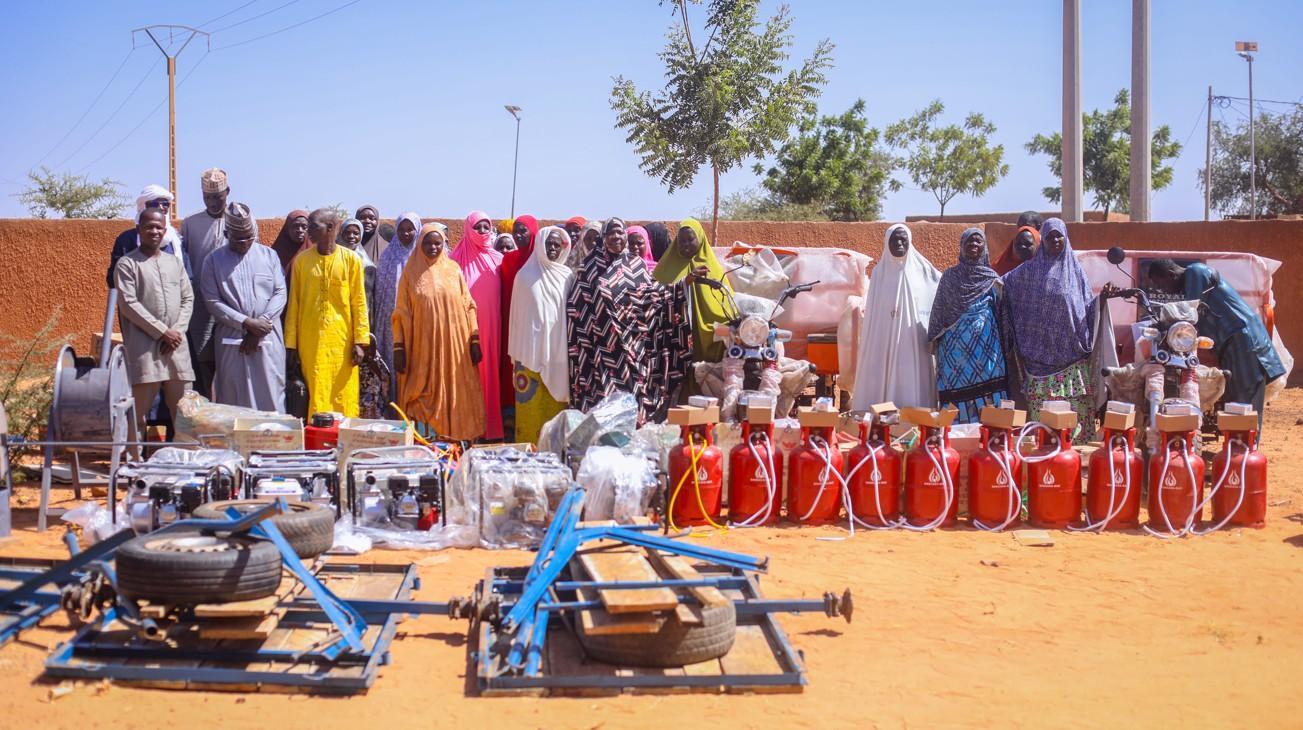
Production, transformation, autonomie : les coopératives du Niger montent en puissance
Halissa HASSAN DAN AZOUMI | 27/01/2026
Dans le cadre du projet ASYPON/GMV, financé par l’Union européenne et mis en œuvre par Enabel, des cérémonies officielles de remise de kits de production et de transformation ont été organisées au profit des Sociétés Coopératives (SCOOPS) appuyées dans plusieurs communes de la région de Tillabéri. Ce projet, inscrit dans le programme Nexus Trois Frontières dans la région de Tillabéri a pour objectif de renforcer la résilience des populations vulnérables, en particulier les femmes et les jeunes, à travers la relance d’une vie économique inclusive et durable, en cohérence avec les objectifs de la Grande Muraille Verte. Les kits remis comprennent notamment des motopompes, tricycles, charrettes asines, équipements de transformation (décortiqueuses, extracteurs d’huile, torréfacteurs, broyeurs) destinés à améliorer la production, la transformation et la commercialisation des produits agro-sylvo-pastoraux.Les autorités administratives et les partenaires ont salué cette initiative, soulignant son impact sur le renforcement de la résilience et de l’autosuffisance alimentaire des communautés. Pour les bénéficiaires, cet appui arrive à point nommé. « Ce matériel vient alléger nos difficultés. Avant, nous entendions seulement parler de ces machines, aujourd’hui elles sont à nous. Grâce à cet appui, nos conditions de travail vont s’améliorer et nos activités vont se développer », témoigne une membre d’une coopérative bénéficiaire. À travers cette action, Enabel réaffirme son engagement à soutenir l’autonomisation économique des femmes, le développement local et la gestion durable des ressources naturelles au profit des communautés de la zone des Trois Frontières.
-
Quand l’échange fait la différence : des résultats qui renforcent la résilience des communautés au Niger
Halissa HASSAN DAN AZOUMI | 27/01/2026
Ce mardi 19 janvier, le Représentant spécial de l’Union européenne pour le Sahel, en visite au Niger, a rencontré la Directrice pays d’Enabel, le Directeur général de l’Agence Nationale de la Grande Muraille Verte (ANGMV) ainsi que l’équipe du projet ASYPON/GMV. Financé par l’Union européenne et mis en œuvre par Enabel en partenariat avec l’ANGMV, le projet contribue au renforcement de la résilience des communautés à travers des actions concrètes sur le terrain. Cette rencontre a permis de présenter les principaux résultats obtenus, illustrés par une projection vidéo et une exposition photo mettant en lumière l’impact des activités réalisées au bénéfice des populations et des écosystèmes.
-

Au Niger, la jeunesse au cœur de la transformation des collèges ruraux
Halissa HASSAN DAN AZOUMI | 27/01/2026
L’éducation, un droit fondamental encore inégal. L’éducation est un droit humain fondamental et un levier essentiel du développement, conformément à l’Objectif de Développement Durable n°4.Au Niger, l’accès à une éducation inclusive et de qualité reste un défi majeur, en particulier pour les filles. L’éloignement des écoles, les mariages précoces, la pauvreté et le manque d’infrastructures scolaires adaptées favorisent les inégalités et les abandons scolaires.Le projet Sarraounia 2 : des collèges transformés en « écoles centres de vie » Face à ces défis, le projet Sarraounia 2, mis en œuvre par Enabel en partenariat avec les ministères en charge de l’Éducation et de la Protection, agit dans la région de Dosso. Il transforme les collèges ruraux en véritables écoles centres de vie, où l’apprentissage dépasse le cadre de la salle de classe.La jeunesse, actrice de la co-création de l’éducation Placée sous le thème « Le pouvoir de la jeunesse dans la co-création de l’éducation », la Journée internationale de l’éducation 2026 met en lumière une approche au cœur de Sarraounia 2 : les élèves sont des acteurs et actrices du changement, aux côtés des enseignants, des parents et des communautés.Promouvoir l’égalité filles-garçons à l’école Le projet encourage l’égalité entre les filles et les garçons grâce à des clubs mixtes d’écoute et de dialogue. Les élèves y apprennent à connaître leurs droits, à identifier les violences et à devenir des alliés contre le harcèlement, les discriminations et les mariages précoces.Le numérique et la solidarité pour lutter contre le décrochage Sarraounia 2 renforce l’accès au numérique avec des salles informatiques connectées, permettant notamment la production du bulletin scolaire Sarraounia Info. Le mentorat entre élèves favorise la solidarité, l’entraide et la réussite collective, contribuant à prévenir le décrochage scolaire.Des activités extrascolaires pour une école plus attractive Sport, jardinage, reboisement, élevage ou activités génératrices de revenus dynamisent la vie scolaire et renforcent l’ancrage de l’école dans sa communauté.Construire une école plus juste, équitable et inclusive En plaçant la jeunesse au cœur de l’action, Sarraounia 2 contribue à bâtir une école équitable, protectrice et inclusive, où filles et garçons participent pleinement à la construction de leur avenir.

